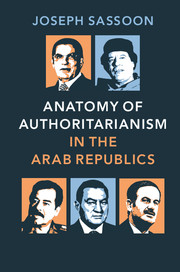Book contents
- Frontmatter
- Dedication
- Contents
- List of tables
- Acknowledgments
- Notes on transliteration
- Glossary and abbreviations
- Map of the eight Arab republics
- Introduction
- 1 Political memoirs in the Arab republics
- 2 Party and governance
- 3 The military
- 4 The role of security services in the Arab republics
- 5 Economy and finance
- 6 Leadership and the cult of personality
- 7 Transition from authoritarianism
- Conclusion
- Appendix Timeline of major events in the Arab republics
- Bibliography
- Index
3 - The military
Published online by Cambridge University Press: 05 March 2016
- Frontmatter
- Dedication
- Contents
- List of tables
- Acknowledgments
- Notes on transliteration
- Glossary and abbreviations
- Map of the eight Arab republics
- Introduction
- 1 Political memoirs in the Arab republics
- 2 Party and governance
- 3 The military
- 4 The role of security services in the Arab republics
- 5 Economy and finance
- 6 Leadership and the cult of personality
- 7 Transition from authoritarianism
- Conclusion
- Appendix Timeline of major events in the Arab republics
- Bibliography
- Index
Summary
The military has played a key role in the history of the Arab republics since their independence from Britain and France, and no institution impacted the history of the region more than the army. The armies were the pride of these republics, regarded as one of their most important institutions, and valued for their inclusiveness in opening their doors to young educated men without too much prejudice about their socio-economic status. Historically, the structure of the armies was modeled on that of their European colonizers who helped to establish them.
The first part of this chapter will look at the military and politics; the second part, at military conflicts and their economic impact; the third section will focus on how the armies themselves were both feared and watched; and the fourth part will examine the lives of soldiers and officers. As in other chapters, the availability of memoirs has largely dictated the discussion, and once again there is a preponderance of Egyptian memoirs over those from other republics.
Military and politics
The role of the military in the Middle East has been discussed at length both before and after the Arab uprisings of 2011. The purpose here, in essence, is to examine the role of the military through the prism of the actors themselves, and to understand civil–military relations as perceived by officers, politicians, and local observers.
After gaining independence from their British and French colonizers, four countries became monarchies (Egypt, Iraq, Libya, and Yemen), while the other four declared their independence as republics (Algeria, Sudan, Syria, and Tunisia). The tumultuous period from the 1950s to the end of the 1960s witnessed the demise of the monarchies, as well as multiple coups d'état in the republics. The new leaders of the eight republics were all military men, except for Tunisia (see Table 3.1), and “the armed forces were highly politicized and rulers generally failed to control them.” In the 1980s, the regimes learned the art of coup-proofing by creating structures that would minimize the possibility of a takeover by a small group of officers and prevent coups d'état. The military experience of their presidents, who rose to their positions due to the army's dominance, enhanced these regimes.
- Type
- Chapter
- Information
- Anatomy of Authoritarianism in the Arab Republics , pp. 73 - 112Publisher: Cambridge University PressPrint publication year: 2016

